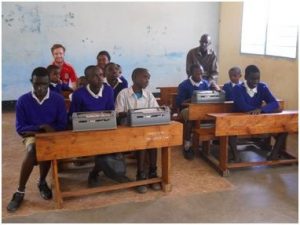Iain Parker (Development Manager) spent a few months in Tanzania researching the impact of Mondo’s projects. During his time there, Iain was able to help with the management of projects and spend time with the beneficiaries of Mondo’s work. There were a lot of positives and many grateful recipients, but as is inevitable in a country ravaged by HIV, a number of heart breaking stories.
Iain spent most of his time working with the grant and loans program, which works like this:
 Recipients, usually HIV+ widows with children, are chosen by local staff. They discuss business ideas and are then given basic business training (they bring their next of kin as well, in case the initial recipient becomes unable to work). After this, they are given a grant of roughly £100 (which goes a lot further in Tanzania) and are supported by local staff to buy the necessary stock and equipment for their business. If the business does well, they are encouraged to apply for a small loan, roughly £200, to invest in their business. After this they have access to larger loans of about £300. These additional injections of capital have allowed businesses to diversify, buy in bulk and some have even grown enough to employ others.
Recipients, usually HIV+ widows with children, are chosen by local staff. They discuss business ideas and are then given basic business training (they bring their next of kin as well, in case the initial recipient becomes unable to work). After this, they are given a grant of roughly £100 (which goes a lot further in Tanzania) and are supported by local staff to buy the necessary stock and equipment for their business. If the business does well, they are encouraged to apply for a small loan, roughly £200, to invest in their business. After this they have access to larger loans of about £300. These additional injections of capital have allowed businesses to diversify, buy in bulk and some have even grown enough to employ others.
 Iain spent a lot of time interviewing recipients to investigate the impact the project has had on their lives and how the project can be improved. Operating in a tough economic environment like Tanzania is not easy for small businesses. However, the research showed overwhelmingly positive results. Women are now able to feed their families regularly, pay for medicines and several have even managed to expand their homes! Many of the stories of the recipients are genuinely inspiring; once they were given this chance to provide for their families they grasped hold of it with everything they have. Many said they had no hope before they received their grant. Now, they dream of sending children to university and building new homes.
Iain spent a lot of time interviewing recipients to investigate the impact the project has had on their lives and how the project can be improved. Operating in a tough economic environment like Tanzania is not easy for small businesses. However, the research showed overwhelmingly positive results. Women are now able to feed their families regularly, pay for medicines and several have even managed to expand their homes! Many of the stories of the recipients are genuinely inspiring; once they were given this chance to provide for their families they grasped hold of it with everything they have. Many said they had no hope before they received their grant. Now, they dream of sending children to university and building new homes.
Iain also checked in on the Blind Unit at Longido Primary School, which is sponsored by Mondo. At the time a number of the Braille machines the children use were broken, making it difficult for all to participate in the lessons at once. These have now been fixed.




Comments are closed.